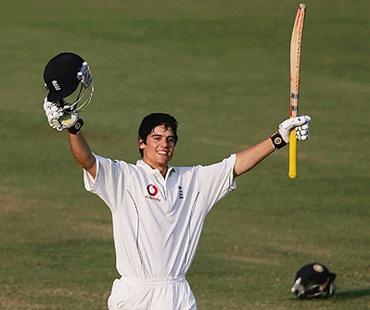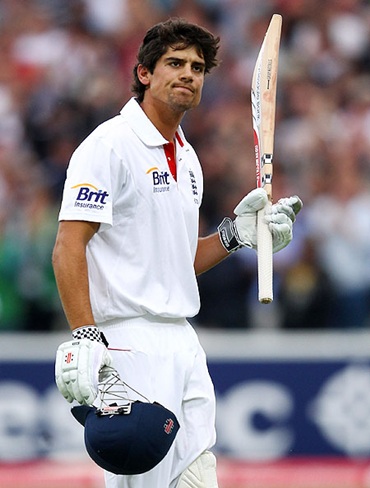 | « Back to article | Print this article |
Cook gave England perfect mix as batsman and captain
It was not only the batsman, but also captain in 28-year-old Alastair Cook that provided the drive for England's Test series win in India, says Bikash Mohapatra.
Alastair Cook was born at a time when the England team, led by David Gower, was on its way to a series win over an Indian side, captained by Sunil Gavaskar.
That result, in the 1984-85 season, remained England's last series win on Indian soil till Monday, when the English succeeded in giving their captain (Cook) the best possible present ahead of his 28th birthday (December 25).
It was sheer coincidence that the series win was sealed in Nagpur, the place where Cook made his Test debut in March 2006.
- India paid price of too much bravado: Nasser Hussain
Then, as a 21-year-old drafted into the England squad as standby for Marcus Trescothick, Cook had made the most of the opportunity, scoring 60-odd runs in the first innings and an unbeaten 104 in the second – making him only the fifth player in history to score a fifty and a century on Test debut.
Now, as captain of the England team, Cook was much more impressive, leading from the front with an aggregate 562 runs in eight innings (@80.29), the highest on either side, and picking the man-of-the-series honours for his effort.
It was not just about the number of runs Cook scored. It was about the manner in which he procured them.
His resilient 176 in the second innings at Motera, even if it couldn't save the Test for England, proved to his teammates that scoring runs was possible on Indian wickets if the batsman remained patient.
Calm mindset ensured Cook a plethora of personal records
Likewise, Cook was content playing second fiddle to a flamboyant Kevin Pietersen (186) in the second Test, scoring 122, as England secured a series-levelling win at the Wankhede.
And it was his magnificent 190 that helped the visitors tighten the noose round the hosts in the third Test at the Eden Gardens.
Even though he failed in both innings in Nagpur, falling prey to poor decisions on both occasions, Cook had done enough to ensure his first Test series as the regular captain was a memorable one in every which way.
The volume of runs he accumulated meant his performance in this series was compared to his effort that helped England to their first series win on Australian soil in more than two decades last year – Cook aggregated 766 runs to finish England's second highest scorer in an Ashes series after Wally Hammond (906 runs).
'Yeah, I suppose I am,' said Cook, when asked if he felt in a similar groove.
'Felt quite calm in the middle. It was nice to be able to keep that calm throughout,' he added.
It was that calm mindset that ensured Cook a plethora of personal records.
While his series aggregate helped him pass Ted Dexter's (409 runs in 1961-62) longstanding mark for the most runs by an England captain in India, Cook (at 27 years, 347 days) overtook Sachin Tendulkar (28 years, 193 days) as the youngest batsman to get past the 7,000 Test runs mark.
If the batsman in Cook made an impact, so did the captain
Besides, his 190 at the Eden Gardens, apart from helping him become the first player to score five centuries in his first five Tests as captain, also helped him become the Englishman with the most hundreds. Wally Hammond had scored his 22nd Test ton against West Indies back in 1939, and four batsmen had joined him since, before Cook went past with his 23rd hundred.
'I wouldn't have known what the record was,' admitted Cook, about his ignorance, adding, 'It's great to have contributed to the team's cause though.'
If the batsman in Cook made an impact, so did the captain. Taking charge with England in doldrums – having dropped a home series to South Africa, losing their No.1 ranking to the same team and the captain (Andrew Strauss) calling it quits – Cook not only helped his team deal with an early shock (at Motera) but also led their revival, that culminated in a memorable series win.
'Cook is not someone who expresses too much of emotion,' explained Jonathan Trott, the centurion in Nagpur, when asked what made Cook a good captain. Nick Compton, Cook's opening partner, concurred.
'He's very clear with his gameplan and taken his game to another level,' he said, adding, 'It does give the other players confidence.'
And if batting coach Graham Gooch is to be believed, it is Cook's perseverance and temperament that makes him a good leader.
'This lad has had a great temperament ever since he started,' explained Gooch, adding, 'He has had the priceless skill of knowing how he could play from the outset and later learnt how to maximise it.
'He is a young captain. He will definitely make mistakes but will also improve along the way.'


